《INTERNATIONAL LAW A TREATISE VOL.I. PEACE》
| 作者 | 编者 |
|---|---|
| 出版 | LONGMANS GREEN,AND CO. |
| 参考页数 | 610 |
| 出版时间 | 1905(求助前请核对) 目录预览 |
| ISBN号 | 无 — 求助条款 |
| PDF编号 | 812874898(仅供预览,未存储实际文件) |
| 求助格式 | 扫描PDF(若分多册发行,每次仅能受理1册) |
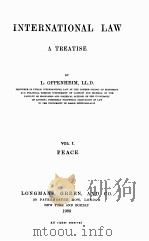
CHAPTER ⅠFOUNDATION OF THE LAW OF NATIONS3
Ⅰ.The Law of Nations as Law3
1.Conception of the Law of Nations3
2.Legal Force of the Law of Nations contested4
3.Characteristics of Rules of Law6
4.Law-giving authority not essential for the existence of Law6
5.Definition and Three Essential Conditions of Law8
6.Law not to be identified with Municipal Law9
7.The “Family of Nations” a Community10
8.The “ Family of Nations” a Community with Rules of Conduct12
9.External Power for the enforcement of Rules of International Conduct12
10.Practice recognises Law of Nations as Law13
Ⅱ.Basis of the Law of Nations15
11.Common Consent the Basis of Law15
12.Common Consent of the Family of Nations the Basis of International Law16
13.States the Subjects of the Law of Nations18
14.Equality an Inference from the Basis of International Law19
Ⅲ.Sources of the Law of Nations20
15.Source in Contradistinction to Cause20
16.The two Sources of International Law21
17.Custom in Contradistinction to Usage22
18.Treaties as Source of International Law23
19.Factors influencing the Growth of International Law24
Ⅳ.RRelations between International and Municipal Law25
20.Essential Difference between International and Municipal Law25
21.Law of Nations never per se Municipal Law26
22.Certain Rules of Municipal Law necessitated or interdicted27
23.Presumption against conflicts between International and Municipal Law28
24.Presumption of Existence of certain necessary Municipal Rules28
25.Presumption of the Existence of certain Municipal Rules in Conformity with Rights granted by the Law of Nations28
25.Case of the “ Franconia ”29
Ⅴ.Dominion of the Law of Nations30
26.Range of Dominion of International Law controversial30
27.Three Conditions of Membership of the Family of Nations31
28.Present Range of Dominion of the Law of Nations32
29.Treatment of States outside the Family of Nations34
Ⅵ.Codification of the Law of Nations35
30.Movement in Favour of Codification35
31.Work of the Hague Peace Conference37
32.U.S.Naval War Code38
33.Value of Codification of International Law contested38
34.Merits of Codification in general39
35.Merits of Codification of International Law41
36.How Codification could be realised43
CHAPTER ⅡDEVELOPMENT AND SCIENCE OF THE LAW OF NATIONS44
Ⅰ.Development of the Law of Nations before Grotius44
37.No Law of Nations in Antiquity44
38.The Jews45
39.The Greeks48
40.The Romans50
41.No need for a Law of Nations during the Middle Ages52
42.The Fifteenth and Sixteenth Century54
Ⅱ.Development of the Law of Nations after Grotius58
43.The time of Grotius58
44.The period 1648-1721……6o58
45.The period 1721-178962
46.The period 1789-181563
47.The period 1815-185665
48.The period 1856-187468
49.The period 1874-189970
50.The Twentieth Century72
51.Five Lessons of the History of the Law of Nations73
Ⅲ.The Science of the Law of Nations76
52.Forerunners of Grotius76
53.Grotius77
54.Zouche81
55.The Naturalists82
56.The Positivists83
57.The Grotians85
58.Treatises of the Nineteenth and Twentieth Centuries87
59.The Science of the Law of Nations in the Nineteenth Cen-tury, as represented by treatises90
60.Collection of Treaties94
61.Bibliographies95
62.Periodicals95
PART ⅠTHE SUBJECTS OF THE LAW OF NATIONS99
CHAPTER ⅠINTERNATIONAL PERSONS99
Ⅰ.Sovereign States aas International Persons99
63.Real and apparent International Persons99
64.Conception of the State100
65.Not-full Sovereign States101
66.Divisibility of Sovereignty contested103
67.Meaning of Sovereignty in the Sixteenth and Seventeenth Centuries103
68.Meaning of Sovereignty in the Eighteenth Century105
69.Meaning of Sovereignty in the Nineteenth Century106
70.Result of the Controversy regarding Sovereignty108
Ⅱ.Recognition of States as International Persons108
71.Recognition a condition of Membership of the Family of Nations108
72.Mode of Recognition110
73.Recognition under Conditions111
74.Recognition Timely and Precipitate112
75.State Recognition in contradistinction to other Recognitions113
Ⅲ.Changes in the Condition of International Persons114
76.Important in contradistinction to Indifferent Changes114
77.Changes not affecting States as International Persons115
78.Changes affecting States as International Persons116
79.Extinction of International Persons117
Ⅳ.Succession of International Persons119
80.Common Doctrine regarding Succession of International Persons119
81.How far Succession actually takes place120
82.Succession in consequence of Absorption121
83.Succession in consequence of Dismemberment123
84.Succession in case of Separation or Cession123
Ⅴ.Composite International Persons125
85.Real and apparent Composite International Persons125
86.States in Personal Union126
87.States in Real Union127
88.Confederated States (Staatenbund)128
89.Federal States (Bundesstaaten)129
Ⅵ.Vassal States133
90.The Union between Suzerain and Vassal State133
91.International position of Vassal States135
Ⅶ.States under Protectorate137
92.Conception of Protectorate137
93.International position of States under Protectorate138
94.Protectorates outside the Family of Nations139
Ⅷ.Neutralised States140
95.Conception of Neutralised States140
96.Act and Condition of Neutralisation141
97.International position of Neutralised States142
98.Switzerland144
99.Belgium145
100.Luxemburg146
101.The Congo Free State146
Ⅸ.Non-Christian States147
102.No essential difference between Christian and other States147
103.International position of non-Christian States besides Turkey and Japan148
Ⅹ.The Holy See149
104.The former Papal States149
105.The Italian Law of Guaranty150
106.International position of the Holy See and the Pope152
107.Violation of the Holy See and the Pope153
ⅩⅠ.International Persons of the Present Day154
108.European States154
109.American States156
110.African States156
111.Asiatic States157
CHAPTER ⅡPOSITION OF THE STATES WITHIN THE FAM1ILY OF NATIONS158
Ⅰ.International Personality158
112.The so.called Fundamental Rights158
113.International Personality a Body of Qualities159
114.Other Characteristics of the position of the States within the Family of Nations160
Ⅱ.Equality, Rank, and Titles161
115.Legal Equality of States161
116.Political Hegemony of Great Powers163
117.Rank of States164
118.The Alternat165
119.Titles of States166
Ⅲ.Dignity167
120.Dignity a Quality167
121.Consequences of the Dignity of States168
122.Maritime Ceremonials169
Ⅳ.Independence and Territorial and Personal Supremacy170
123.Independence and Territorial as well as Personal Supremacy as Aspects of Sovereignty170
124.Consequences of Independence and Territorial and Personal Supremacy171
125.Violations of Independence and Territorial and Personal Supremacy172
126.Restrictions upon Independence173
127.Restrictions upon Territorial Supremacy175
128.Restrictions upon Personal Supremacy176
Ⅴ.Self-preservation177
129.Self-preservation an excuse for violations177
130.What acts of self-preservation are excused178
131.Case of the Danish Fleet179
132.Case of Amelia Island180
133.Case of the “ Caroline ”180
Ⅵ.Intervention181
134.Conception and Character of Intervention181
135.Intervention by Right183
136.Admissibility of Intervention in default of Right185
137.Intervention in the interest of Humanity186
138.Intervention de facto a Matter of Policy187
139.The Monroe Doctrine188
140.Merits of the Monroe Doctrine190
Ⅶ.Intercourse191
141.Intercourse a presupposition of International Personality191
142.Consequences of Intercourse as a presupposition of Inter-national Personality193
Ⅷ.Jurisdiction194
143.Jurisdiction important for the position of the States within the Family of Nations194
144.Restrictions upon Territorial Jurisdiction194
145.Jurisdiction over Citizens abroad195
146.Jurisdiction on the Open Sea195
147.Criminal Jurisdiction over Foreigners in Foreign States196
CHAPTER ⅢRESPONSIBILITY OF STATES198
Ⅰ.On State Responsibility in General198
148.Nature of State Responsibility198
149.Original and Vicarious State Responsibility199
150.Essential Difference between Original and Vicarious Re-sponsibility200
Ⅱ.State Responsibility for International Delinquenciea201
151.Conception of International Delinquencies201
152.Subjects of International Delinquencies202
153.State Organs able to commit International Delinquencies203
154.No International Delinquency without Malice or culpable Negligence203
155.Objects of International Delinquencies204
156.Legal consequences of International Delinquencies204
Ⅲ.State Beaponsibility for Acts of State Organs206
157.Responsibility varies with Organs concerned206
158.Internationally injurious Acts of Heads of States206
159.Internationally injurious Acts of Members of Governments206
160.Internationally injurious Acts of Diplomatic Envoys207
161.Internationally injurious Attitudes of Parliaments208
162.Internationally injurious Acts of Judicial Functionaries208
163.Internationally injurious Acts of administrative Officials and Military and Naval Forces209
Ⅳ.State Responsibility for Acts of Private Persons211
164.Vicarious in contradistinction to Original State Responsi-bility for Acts of Private Persons211
165.Vicarious responsibility for Acts of Private Persons relative only211
166.Municipal Law for Offences against Foreign States212
167.Responsibility for Acts of Insurgents and Rioters212
PART ⅡTHE OBJECTS OF THE LAW OF NATIONS217
CHAPTER ⅠSTATE TERRITORY217
Ⅰ.On State Territory in General217
168.Conception of State Territory217
169.Different kinds of Territory218
170.Importance of State Territory219
171.One Territory, one State220
Ⅱ.The different Parts of State Territory222
172.Real and Fictional Parts of Territory222
173.Territorial Subsoil223
174.Territorial Atmosphere223
175.Inalienability of Parts of Territory224
Ⅲ.Rivers225
176.Rivers State Property of Riparian States225
177.Navigation on National, Boundary, and not National Rivers226
178.Navigation on International Rivers227
Ⅳ.Lakes and Land-locked Seas230
179.Lakes and Land-locked Seas State Property of Riparian States230
180.So-called International Lakes and Land locked Seas231
181.The Black Sea231
Ⅴ.Canals233
182.Canals State Property of Riparian States233
183.The Suez Canal234
184.The Panama Canal236
Ⅵ.Maritime Belt239
185.State Property of Maritime Belt contested239
186.Breadth of Maritime Belt240
187.Fisheries, Cabotage, Police, and Maritime Ceremonials within the Belt242
188.Navigation within the Belt242
189.Jurisdiction within the Belt244
190.Zone for Revenue and Sanitary Laws245
Ⅶ.Gulfs and Bays246
191.Territorial Gulfs and Bays246
192.Non-territorial Gulfs and Bays247
193.Navigation and Fishery in Territorial Gulfs and Bays248
Ⅷ.Straits249
194.What Straits are Territorial249
195.Navigation, Fishery, and Jurisdiction in Straits250
196.The former Sound Dues250
197.The Bosphorus and Dardanelles251
Ⅸ.Boundaries of State Territory253
198.Natural and Artificial Boundaries253
199.Boundary Waters254
200.Boundary Mountains255
201.Boundary Disputes255
202.Natural Boundaries sensu politico256
Ⅹ.State Servitudes257
203.Conception of State Servitudes257
204.Subjects of State Servitudes258
205.Object of State Servitudes259
206.Different kinds of State Servitudes260
207.Validity of State Servitudes261
208.Extinction of State Servitudes262
ⅩⅠ.Modes of acquiring State Territory263
209.Who can acquire State Territory?263
210.Former Doctrine concerning Acquisition of Territory265
211.What Modes of Acquisition of Territory there are266
212.Original and derivative Modes of Acquisition267
ⅩⅡ.Cession268
213.Conception of cession of State Territory268
214.Subjects of cession268
215.Object of cession269
216.Form of cession270
217.Tradition of the ceded Territory272
218.Veto of third Powers272
219.Plebiscite and option273
ⅩⅢ.Occupation275
220.Conception of Occupation275
221.Object of Occupation276
222.Occupation how effected276
223.Inchoate Title of Discovery277
224.Notification of Occupation to other Powers278
225.Extent of Occupation279
226.Protectorate as Precursor of Occupation280
227.Spheres of influence281
228.Consequences of Occupation282
ⅩⅣ.Accretion283
229.Conception of Accretion283
230.Different kinds of Accretion284
231.Artificial formations284
232.Alluvions284
233.Deltas285
234.New-born Islands285
235.Abandoned River-beds286
ⅩⅤ.Sub jugation287
236.Conception of Conquest and of Subjugation287
237.Subjugation in Contradistinction to Occupation288
238.Justification of Subjugation as a Mode of Acquisition288
239.Subjugation of the whole or of a part of Enemy Territory289
240.Consequences of Subjugation290
241.Veto of third Powers292
ⅩⅥ.Prescription293
242.Conception of Prescription293
243.Prescription how effected294
ⅩⅦ.Loss of State Territory294
244.Six modes of losing State Territory296
245.Operation of Nature297
246.Revolt297
247.Dereliction298
CHAPTER ⅡTHE OPEN SEA300
Ⅰ.Rise of the Freedom of the Open Sea300
248.Former Claims to Control over the Sea300
249.Practical Expression of claims to Maritime Sovereignty302
250.Grotius’s Attack on Maritime Sovereignty303
251.Gradual recognition of the Freedom of the Open Sea305
Ⅱ.Conception of the Open Sea306
252.Discrimination between Open Sea and Territorial Waters306
253.Clear Instances of Parts of the Open Sea307
Ⅲ.The Freedom of the Open Sea308
254.Meaning of the Term “Freedom of the Open Sea”308
255.Legal Provisions for the Open Sea309
256.Freedom of the Open Sea and war310
257.Navigation and ceremonials on the Open Sea311
258.Claim of States to Maritime Flag312
259.Rationale for the Freedom of the Open Sea313
Ⅳ.Jurisdiction on the Open Sea315
260.Jurisdiction on the Open Sea mainly connected with Flag315
261.Claim of Vessels to sail under a certain Flag316
262.Ship Papers317
263.Names of Vessels318
264.Territorial Quality of Vessels on the Open Sea318
265.Safety of Traffic on the Open Sea319
266.Powers of Men-of-war over Merchantmen of all Nations320
267.How Verification of Flag is effected322
268.How Visit is effected322
269.How Search is effected323
270.How Arrest is effected323
271.Shipwreck and Distress on the Open Sea324
Ⅴ.Piracy325
272.Conception of Piracy325
273.Private Ships as Subjects of Piracy326
274.Mutinous Crew and Passengers as Subjects of Piracy327
275.Object of Piracy328
276.Piracy how effected328
277.Where Piracy can be committed329
278.Jurisdiction over Pirates and their Punishment330
279.Pirata non mutat dominium331
280.Piracy according to Municipal Law331
Ⅵ.Fisheries in the Open Sea333
281.Fisheries in the Open Sea free to all Nations333
282.Fisheries in the North Sea334
283.Bumboats in the North Sea335
284.Seal Fisheries in Behring Sea336
285.Fisheries around the Faroe Islands and Iceland337
286.Telegraph Cables in the Open Sea admitted338
287.International Protection of Submarine Telegraph Cables339
CHAPTER ⅢINDIVIDUALS341
Ⅰ.Position of Individuals in International Lav341
288.Importance of Individuals to the Law of Nations341
289.Individuals never Subjects of the Law of Nations341
290.Individuals Objects of the Law of Nations344
291.Nationality the Link between Individuals and the Law of Nations345
292.The Law of Nations and the Rights of Mankind346
Ⅱ.Nationality348
293.Conception of Nationality348
294.Function of Nationality349
295.So-called Proteges and de facto Subjects350
296.Nationality and Emigration351
Ⅲ.Modes of Acquiring and Losing Nationality352
297.Five Modes of Acquisition of Nationality352
298.Acquisition of Nationality by Birth352
299.Acquisition of Nationality through Naturalisation353
300.Acquisition of Nationality through Redintegration354
301.Acquisition of Nationality through Subjugation and Cession.355
302.Seven modes of losing Nationality355
Ⅳ.Naturalisation in Especial357
303.Conception and Importance of Naturalisation357
304.Object of Naturalisation358
305.Conditions of Naturalisation359
306.Effect of Naturalisation upon previous Citizenship359
307.Naturalisation in Great Britain360
Ⅴ.Double and Absent Nationality362
308.Possibility of Double and Absent Nationality362
309.How Double Nationality occurs363
310.Position of Individuals with Double Nationality364
311.How Absent Nationality occurs365
312.Position of Individuals destitute of Nationality366
313.Redress against Difficulties arising from Double and Absent Nationality366
314.No Obligation to admit Foreigners369
315.Reception of Foreigners under conditions370
316.So-called Right of Asylum371
Ⅶ.Position of Foreigners after Reception371
317.Foreigners subjected to Territorial Supremacy372
318.Foreigners in Eastern Countries373
319.Foreigners under the Protection of their Home State374
320.Protection to be afforded to Foreigners’ Persons and Pro-perty375
321.How far Foreigners can be treated according to Discretion376
322.Departure from the Foreign Country377
Ⅷ.Expulsion of Foreigners378
323.Competence to expel Foreigners378
324.Just Causes of Expulsion of Foreigners379
325.Expulsion how ef ected381
326.Reconduction in Contradistinction to Expulsion381
Ⅸ.Extradition382
327.Extradition no legal duty382
328.Extradition Treaties how arisen383
329.Municipal Extradition Laws385
330.Object of Extradition386
331.Extraditable Crimes387
332.Effectuation and Condition of Extradition388
Ⅹ.Principle of Non-Extradition of Political Criminals389
333.How Non-extradition of Political Criminals became the Rule389
334.Difficulty concerning the Conception of Political Crime392
335.The so-called Belgian Attentat Clause394
336.The Russian Project of 1881394
337.The Swiss Solution of the Problem in 1892395
338.Rationale for the Principle of Non-extradition of Political Criminals395
339.How to avoid Misapplication of the Principle of Non-extradition of Political Criminals398
340.Reactionary Extradition Treaties400
PART ⅢORGANS OF THE STATE FOR THEIR INTERNATIONALRELATIONS403
CHAPTER ⅠIHEADS OF STATES AND FOREIGN OFFICES403
Ⅰ.Position of Heads of States according to International Law403
341.Necessity of a Head for every State403
342.Recognition of Heads of States403
343.Competence of Heads of States405
344.Heads of States Objects of the Law of Nations406
345.Honours and Privileges of Heads of States406
Ⅱ.Monarchs407
346.Sovereignty of Monarchs407
347.Consideration due to Monarchs at home407
348.Consideration due to Monarchs abroad407
349.The Retinue of Monarchs abroad410
350.Monarchs travelling incognito410
351.Deposed and Abdicated Monarchs411
352.Regents411
353.Monarchs in the seryice or subiects of Foreign Powers411
Ⅲ.Presidents of Republics412
354.Presidents not Sovereigns412
355.Position of Presidents in general412
356.Position of Presidents abroad413
Ⅳ.Foreign Offices414
357.Position of the Secretary for Foreign Affairs414
CHAPTERⅡEIPLOMATIC ENVOYS416
Ⅰ.The Institution of Legation416
358.Development of Legations416
359.Diplomacy418
Ⅱ.Right of Legation419
360.Conception of Right of Legation419
361.What States possess the Right of Legation420
362.Right of Legation by whom exercised421
Ⅲ.Kinds and Classes of Diplomatic Envoys422
363.Envoys Ceremonial and Political422
364.Classes of Diplomatic Envoys423
365.Ambassadors424
366.Ministers Plenipotentiary and Envoys Extraordinary424
367.Ministers Resident424
368.Charges d’Affaires425
369.The Diplomatic Corps425
Ⅳ.Appointment of Diplomatic Envoys426
370.Person and Qualification of the Envoy426
371.Letter of Credence, Full Powers, Passports426
372.Combined Legations428
373.Appointment of several Envoys428
Ⅴ.Reception of Diplomatic Envoys429
374.Duty to receive Diplomatic Envoys429
375.Refusal to receive a certain Individual430
376.Mode and Solemnity of Reception431
377.Reception of Envoys to Congresses and Conferences432
Ⅵ.Functions of Diplomatic Envoys433
378.On Diplomatic Functions in general433
379.Negotiation433
380.Observation434
381.Protection434
382.Miscellaneous Functions435
383.Envoys not to interfere in Internal Politics435
Ⅶ.Position of Diplomatic Envoys436
384.Diplomatic Envoys objects of International Law436
385.Privileges due to Diplomatic Envoys437
Ⅷ.Inviolability of Diplomatic Envoys438
386.Protection due to Diplomatic Envoys438
387.Exemption from Criminal Jurisdiction439
388.Limitation of Inviolability440
Ⅸ.Exterritoriality of Diplomatic Envoys441
389.Reason and Fictional Character of Exterritoriality441
390.Immunity of Domicile441
391.Exemption from Criminal and Civil Jurisdiction445
392.Exemption from Subpcena as witness446
393.Exemption from Police447
394.Exemption from Taxes and the like447
395.Right of Chapel448
396.Self jurisdiction449
Ⅹ.Position of Diplomatic Envoys as regards Third States450
397.Possible Cases450
398.Envoy travelling through Territory of third State450
399.Envoy found by Belligerents on occupied Enemy Territory452
400.Envoy interfering with affairs of a third State452
ⅩⅠ.The Retinue of Diplomatic Envoys453
401.Different Classes of Members of Retinue453
402.Privileges of Members of Legation454
403.Privileges of Private Servants455
404.Privileges of Family of Envoy455
405.Privileges of Couriers of Envoys456
ⅩⅡ.Termination of Diplomatic Mission456
406.Termination in contradistinction to Suspension456
407.Accomplishment of Object of Mission457
408.Expiration of Letter of Credence457
409.Recall458
410.Promotion to a higher Class459
411.Delivery of Passports459
412.Request for Passports459
413.Outbreak of War459
414.Constitutional Changes459
415.Revolutionary Changes of Government 460
416.Extinction of sending or receiving State 460
417.Death of Envoy461
CHAPTER ⅢCONSULS463
Ⅰ.The Institution of Consuls463
418.Development of the Institution of Consuls463
419.General Character of Consuls465
Ⅱ.Consular Organisation466
420.Different kinds of Consuls466
421.Consular Districts467
422.Different classes of Consuls467
423.Consuls subordinate to Diplomatic Envoys468
Ⅲ.Appointment of Consuls469
424.Qualication of Candidates469
425.No State obliged to admit Consuls469
426.What kind of States can appoint Consuls470
427.Mode of Appointment and of Admittance470
428.Appointment of Consuls includes Recognition471
Ⅳ.Functions of Consuls472
429.On Consular Functions in general472
430.Fosterage of Commerce and Industry472
431.Supervision of Navigation473
432.Protection473
433.Notarial Functions474
Ⅴ.Position and Privileges of Consuls475
434.Position475
435.Consular Privileges476
Ⅵ.Termination of Consular Office478
436.Undoubted Causes of Termination478
437.Doubtful Causes of Termination478
438.Change in the Headship of States no cause of Termination478
Ⅶ.Consuls in non-Christian States479
439.Position of Consuls in non-Christian States479
440.Consular Jurisdiction in non-Christian States480
441.International Courts in Egypt480
442.Exceptional Character of Consuls in non-Christian States481
CHAPTER Ⅳ MISCELLANEOUS AGENCIES482
Ⅰ.Armed Forces on Foreign Territory482
443.Armed Forces State Organs482
444.Occasions for Armed Forces abroad482
445.Position of Armed Forces abroad483
446.Case of McLeod483
Ⅱ.Men-of-uvar in Foreign Waters485
447.Men-of-war State Organs485
448.Proof of Character as Men-of-war485
449.Occasions for Men-of-war abroad486
450.Position of Men-of-war in foreign waters487
451.Position of Crew when on Land abroad488
Ⅲ.Agents without Diplomatic or Consular Character488
452.Agents lacking diplomatic or consular character489
453.Public Political Agents489
454.Secret Political Agents490
455.Spies491
456.Commissaries492
457.Bearers of Despatches492
Ⅳ.International Commissions493
458.Permanent in Contradistinction to Temporary Commissions.493
459.Commissions in the interest of Navigation494
460.Commissions in the interest of Sanitation495
461.Commissions in the interest of Foreign Creditors495
462.Permanent Commission concerning Sugar496
Ⅴ.International Offices496
463.Character of International Offices496
464.International Telegraph Office496
465.International Post Office496
466.International Office of Weights and Measures497
467.International Office for the Protection of Works of Literature and Art and of Industrial Property497
468.International Maritime Office at Zanzibar497
469.International Office of Customs Tariffs497
470.Central Office of International Transports497
471.Permanent Office of the Sugar Convention498
Ⅵ.The International Court of Arbitration498
472.Organisation of Court in general498
473.The Permanent Council498
474.The International Bureau499
475.The Court of Arbitration499
476.The Deciding Tribunal500
PART Ⅳ INTERNATIONAL TRANSACTIONS505
CHAPTER Ⅰ ON INTERNATIONAL TRANSACTIONS IN GENERAL505
Ⅰ.Negotiation505
477.Conception of Negotiation505
478.Parties to Negotiation505
479.Purpose of Negotiation506
480.Negotiations by whom conducted507
481.Form of Negotiation508
482.End and Effect of Negotiation508
Ⅱ.Congresses and Conferences509
483.Conception of Congresses and Conferences509
484.Parties to Congresses and Conferences510
485.Procedure at Congresses and Conferences511
Ⅲ.Transactions besides Negotiation513
486.Different kinds of Transaction513
487.Declaration513
488.Notification514
489. Protest515
490.Renunciation515
CHAPTER ⅡTREATIES517
Ⅰ.Character and Function of Treaties517
491.Conception of Treaties517
492.Different kinds of Treaties517
493.Binding Force of Treaties519
Ⅱ.Parties to Treaties521
494.The Treaty-making Power521
495.Treaty-making Power exercised by Heads of States522
496. Minor Functionarles exercising Treaty-making Power523
497.Constitutional Restrictions523
498.Mutual Consent of the Contracting Parties524
499.Freedom of Action of consenting Representatives525
500.Delusion and Error in Contracting Parties525
Ⅲ.Objects of Treaties526
501.Objects in general of Treaties526
502.Obligations of Contracting Parties only can be Object527
503.An Obligation inconsistent with other Obligations cannot be an Object527
504.Object must be physically possible527
505.Immoral Obligations527
506.Illegal Obligations528
Ⅳ.Form and Parts of Treaties528
507.No necessary Form of Treaties528
508.Acts, Conventions, Declarations529
509.Parts of Treaties530
Ⅴ.Ratification of Treaties531
510.Conception and Function of Ratification531
511.Rationale for the Institution of Ratification532
512.Ratification regularly, but not absolutely, necessary533
513.Space of Time for Ratification534
514.Refusal of Ratification534
515.Form of Ratification535
516.Ratification by whom effected536
517.Ratification cannot be partial and conditional537
518.Effect of Ratification538
Ⅵ.Effect of Treaties539
519.Effect of Treaties upon Contracting Parties539
520.Effect of Treaties upon the Subjects of the Parties539
521.Effect of Changes in Government upon Treaties540
522.Effect of Treaties upon Third States541
Ⅶ.Means of Securing Performance of Treaties542
523.What means have been in use542
524.Oaths542
525.Hostages543
526.Pledge543
527.Occupation of Territory543
528.Guarantee544
Ⅷ.Participation of Third States in Treaties544
529.Interest and Participation to be distinguished544
530.Good Offices and Mediation545
531.Intervention545
532.Accession546
533.Adhesion546
Ⅸ.Expiration and Dissolution of Treaties547
534.Expiration and Dissolution in Contradistinction to Fulfil-ment547
535.Expiration through Expiration of Time548
536.Expiration through Resolutive Condition548
537.Mutual Consent548
538.Withdrawal by Notice549
539.Vital Change of Circumstances550
Ⅹ.Voidance of Treaties553
540.Grounds of Voidance553
541.Extinction of one of the two Contracting Parties553
542.Impossibility of Execution554
543.Realisation of Purpose of Treaty other than by Fulfilment554
544.Extinction of such Object as was concerned in a Treaty554
ⅩⅠ.Cancellation of Treaties555
545.Grounds of Cancellation555
546.Inconsistency with subsequent International Law555
547.Violation by one of the Contracting Parties555
548.Subsequent Change of Status of one of the Contracting Parties556
549.War557
ⅩⅡ.Renewal, Reconfirnation, and Redintegration of Treaties557
550.Renewal of Treaties557
551.Reconfirmation558
552.Redintegration558
ⅩⅢ.Interpretation of Treaties559
553.Authentic Interpretation, and the Compromise Clause559
554.Rules of Interpretation which recommend themselves560
CHAPTER ⅢIMPORTANT GROUPS OF TREATIES563
Ⅰ.Important Law-making Treaties563
555.Important Law-making Treaties a product of the Nineteenth Century563
556.Final Act of the Vienna Congress564
557.Protocol of the Congress of Aix-la-Chapelle564
558.Treaty of London of 1831564
559.Declaration of Paris564
560.Geneva Convention565
561.Treaty of London of 1867566
562.Declaration of St.Petersburg566
563.Treaty of Berlin of 1878566
564.General Act of the Congo Conference566
565.Treaty of Constantinople of 1888567
566.General Act of the Brussels Anti-Slavery Conference567
567.Final Act of the Hague Peace Conference567
568.Treaty of Washington of 1901568
Ⅱ.Alliances569
569.Conception of Alliances569
570.Parties to Alliances570
571.Different kinds of Alliances571
572.Conditions of Alliances571
573.Casus Fosderis572
Ⅲ.Treaties of Guarantee and of Protection573
574.Conception and Objects of Guarantee Treaties573
575.Effect of Treaties of Guarantee574
576.Effect of Collective Guarantee575
577.Treaties of Protection576
Ⅳ.Unions Concerning Comnmnon Non-Political Interests576
578.Common in Contradistinction to Particular Interests576
579.Universal Postal Union577
580.Universal Telegraph Union578
581.Union Concerning Railway Transports and Freights578
582.Convention concerning the Metric System579
583.Union for Protection of Industrial Property579
584.Union for Protection of Works of Literature and Art579
585.Union for the Publication of Customs Tariffs580
586.Conventions concerning Private International Law580
587.Phylloxera Conventions581
588.Sanitary Conventions581
589.Monetary Unions581
590.Convention for Preservation of Wild Animals in Africa582
591.Convention concerning Bounties on Sugar582
APPENDIⅨ THE ANGLo-FRENcH AGRREMENT oF APRIL 8, 1904585
Ⅰ.Declaration respecting Egypt and Morocco585
Ⅱ.Convention signed at London, April 8, 1904588
Ⅲ.Declaration concerning Siam, Madagascar, and the New Hebrides593
INDEX595
1905《INTERNATIONAL LAW A TREATISE VOL.I. PEACE》由于是年代较久的资料都绝版了,几乎不可能购买到实物。如果大家为了学习确实需要,可向博主求助其电子版PDF文件(由 1905 LONGMANS GREEN,AND CO. 出版的版本) 。对合法合规的求助,我会当即受理并将下载地址发送给你。
高度相关资料
-

- PRIVATE INTERNATIONAL LAW AND THE RETROSPECTIVE OPERATION OF STATUTES A TREATISE ON THE CONFLICT OF
- 1880
-
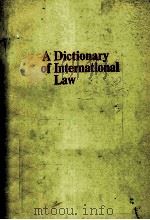
- A DICTIONARY OF INTERNATIONAL LAW
- 1982 PROGRESS PUBLISHERS
-
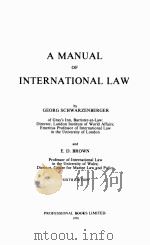
- A MANUAL OF INTERNATIONAL LAW
- 1976 PROFESSIONAL BOOKS LIMITED
-

- LAW AND PEACE
- 1942 HARVARD UNIVERSITY PRESS
-

- PEACE THROUGH LAW
- 1944 CHAPEL HILL
-
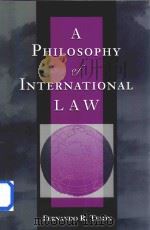
- A Philosophy of International Law
- 1998 Westview Press
-

- CANADIAN CRIMINAL LAW A TREATISE SECOND EDITION
- 1987 THE CARSWELL COMPANY LIMITED
-

- LAW OF LIMITATION VOL.I
- 1983 EASTERN BOOK COMPANY
-
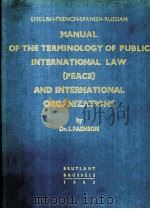
- MANUAL OF THE TERMINOLOGY OF PUBLIC INTERNATIONAL LAW (PEACE) AND INTERNATIONAL ORGANIZTIONS
- 1983 BRYLANT BRUSSELS
-

- A TREATISE ON THE LAW OF PRIZE SECOND EDITION
- 1940 THE GROTIUS SOCIETY
-
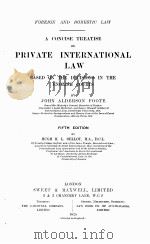
- A CONCISE TREATISE ON PRIVATE INTERNATIONAL LAW FIFTH EDITION
- 1925 THE CARSWELL COMPANY
-

- A TREATISE ON PRIVATE INTERNATIONAL LAW SEVENTH EDITION
- 1925 SWEET AND MAXWELL
-
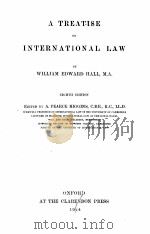
- A TREATISE INTERNATIONAL LAW EIGHTH EDITION
- 1924 OXFORD AT THE CLARENDON PRESS
-

- A Treatise on The Law Of Collisions at Sea
- 1880 Stevens And Sons
提示:百度云已更名为百度网盘(百度盘),天翼云盘、微盘下载地址……暂未提供。➥ PDF文字可复制化或转WORD
